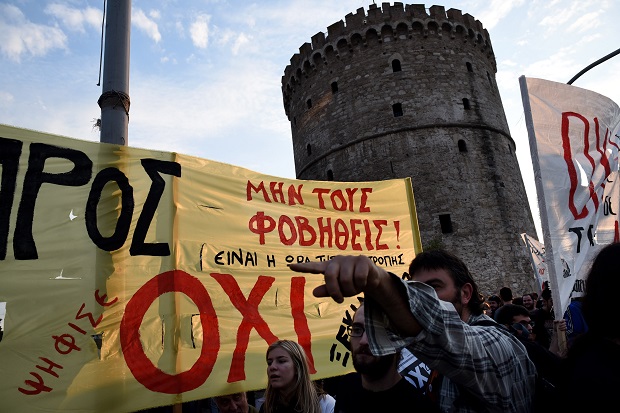Split Greece teeters on the brink with referendum

A demonstrator gestures in front of a banner reading ”NO, not to fear” during a rally by supporters of the no vote to the upcoming referendum in the northern Greek port city of Thessaloniki, Wednesday, July 1, 2015. Eurozone finance ministers decided Wednesday to break off talks on more aid for Greece until after it holds a weekend referendum, even as the Greek government pressed ahead with plans to let the people decide whether to accept more austerity measures in exchange for a rescue deal. AP
ATHENS, Greece – Greece hurtled Saturday towards a crunch bailout referendum which could determine its financial future and even its place in the Eurozone, as anxious families unnerved by the country’s uncertain outlook rushed to stock up on food.
On the eve of the vote that could also make or break the radical-left government, Greeks were spooked by rumors that capital controls were leading to food and medicine shortages, and questions were being raised on when the country’s banks would re-open.
Middle-aged toyshop assistant Marilena said she was buying “food, only food nothing else” for her children.
“I’ve heard shops are running out of flour, sugar and salt. I’m really worried, how will we manage if we can’t get to our money and there’s no food to buy?” Lena Antoniou, a 35-year old mother of two, told AFP.
Nikos Archondis from the Panhellenic Exporters Association (PEA) told AFP “certain supermarkets are very concerned because they cannot forecast how the situation will evolve,” adding that stocks of meat, cheeses, fruits and vegetables “risk running low in the following weeks”.
Article continues after this advertisementMany businesses said they had been forced to ask workers to take unpaid leave, some shops were refusing card payments in an effort to hoard cash and there were reports of companies paying workers in IOUs valid in local supermarkets.
Article continues after this advertisement‘Malicious rumor’
Greece’s debt crisis had taken a dramatic turn after Prime Minister Alexis Tsipras suddenly called the referendum on bailout conditions early last Saturday.
Tsipras’s gambit sparked consternation among his country’s international creditors, and led to the breaking off of talks on the rescue plan just days before the country was due to repay 1.5 billion euros to the IMF.
With nothing left in the state’s coffers, Greece defaulted on its IMF debt, and was forced on Monday to impose capital controls and close banks to halt a hemorrhage of cash as nervous Greeks rushed to withdraw money.
Nevertheless, Tsipras got a rock-star welcome at a 25,000-strong rally in Athens late Friday where he sought to revive support for the ‘No’ vote, saying it would strengthen his hand in talks with international creditors.
EU leaders have warned that a ‘No’ victory could cause Greece to crash out of the Eurozone. But Tsipras and his closest ally Finance Minister Yanis Varoufakis have accused them of fear-mongering.
In an interview published Saturday the outspoken Varoufakis accused Athens’s creditors of “terrorism”.
As tensions rose he was forced to deny a Financial Times report that suggested Greek savers could lose 30 percent of their bank deposits to shore up the banking system, slamming it a “malicious rumor”.
A rival rally on Friday of 22,000 “Yes” supporters shouted pro-European slogans and voiced fears of a so-called “Grexit” from the Eurozone and a return to Greece’s former currency, the drachma, if Tsipras got his way.
The latest voter intention polls, published late Friday, showed the nation of 11 million people was evenly divided.
A GPO poll put the ‘Yes’ voters at 44.1 percent and the ‘Nos’ at 43.7 percent, while an Alco survey found 44.5 percent would vote ‘Yes’ while 43.9 percent would vote ‘No’.